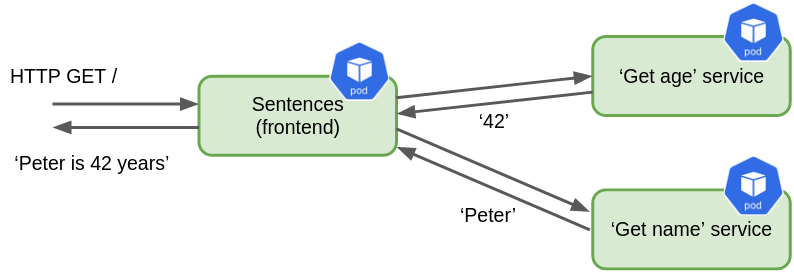Istio Katas
This repository contain exercises for the Istio service mesh. Exercises assume access to a Kubernetes cluster with Istio, Kiali and Jaeger tracing.
Exercises
Deployment Patterns and Observability
- Blue/green Deployments
- Blue/green Deployments Using Kubernetes Labels
- Canary Deployments
- Network Delay Investigations - Simple
- Network Delay Investigations - Larger Application Graph
🚧 WIP: Network Delay Investigations with Jaeger- A Tour of the Istio Metrics
Designing and Securing the Mesh
- Getting Traffic into the Mesh with Ingress Gateways
🚧 WIP: Getting Traffic out of the Mesh- Multiple Teams and Separation of Duties
- Controlling Load Balancing
- Locality/Topology Aware Load Balancing and Failover
- Securing with Mutual TLS
- Debugging with Ephemeral Containers
- When not to use TLS
- Authorization - HTTP Network Policies
- Authentication with OIDC
Improving Applications
- Circuit Breakers
Using gRPC
Architectural Patterns
- Multi-mesh and Migrations
Deployment Patterns
Exercises will cover the following deployment patterns:
-
Blue/green. This pattern have multiple service versions deployed for test. Tests are being performed against different versions based on a deliberate choice of the version to use. I.e. this is typically used for tests being performed by testers or test frameworks.
-
Canary. This pattern have multiple versions deployed for test and both/all versions are in active use. The version to use are determined on each request based on statistics, e.g. 1% of traffic should go to the test version. Typically its end-users that are being exposed to this.
Typically, blue/green and canary deployments are used in succession. First blue/green deployments are used to validate a new version in a production environment such that other production-dependencies can be included in the tests. When deliberate testing using blue/green deployments have proved the software to be OK, a larger group of users are exposed to the new version using canary deployments.
Another deployments pattern is:
- A/B testing. With this type of deployment, a certain percentage of end-users are exposed to a test version. This is typically used to test out different hypothesis, e.g. "a larger 'Buy' button makes users more liable to buy products".
Test Application
The test application implements a simple 'sentences' builder, which can build sentences from the following simple algorithm:
age = random(0,100)
name = random(['Peter','Ray','Egon'])
return name + ' is ' + age + ' years'
i.e. it returns sentences of the form: 'Peter is 42 years'.
The application is made up of three services, one which can be queried for the
random age, one which can be queried for a random name and a frontend, which
calls the two other through HTTP requests and formats the final sentences. This
is deployed to Kubernetes using three Deployments - typically with names like
age, name and sentences.
The Python source for the application can be found
here. Note that the application is a 'test'
application and thus configurable for different test purposes. Much of the
configuration is through environment variables. The most important environment
variable is SENTENCE_MODE which define whether the application is running in
age, name or sentences mode.
